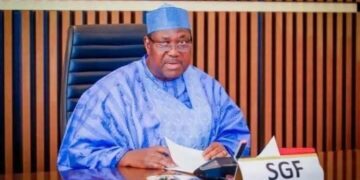Governors from states led by the Peoples Democratic Party (PDP) have filed a lawsuit before the Supreme Court, challenging the six-month suspension of Rivers State Governor Siminalayi Fubara.
Fubara, his deputy Ngozi Odu, and members of the Rivers State House of Assembly were suspended by President Bola Tinubu on March 18, after he declared a state of emergency in the state and appointed a sole administrator to govern. In response, the legislature supported the president’s decision to enforce the suspension.
However, the governors of Bauchi, Adamawa, Bayelsa, Enugu, Osun, Plateau, and Zamfara states are contesting the president’s authority to implement such a suspension. Named as respondents in the suit are President Tinubu and the National Assembly.
Through their Attorney-Generals, the seven governors argue that the suspension is unconstitutional. They are urging the Supreme Court to declare that the president has no legal authority to suspend a democratically elected governor, deputy governor, or state legislature under the guise of declaring a state of emergency, citing Sections 1(2), 5(2), and 305 of the 1999 Constitution (as amended).
The governors are also seeking a declaration that the president lacks the power to suspend a state’s House of Assembly under the provisions of Sections 192(4)(6) and 305 of the Constitution of Nigeria (1999, as amended).
The plaintiffs, the seven governors, are requesting the Supreme Court to declare the suspension of Governor Fubara, his deputy, and the members of the Rivers State House of Assembly unconstitutional and unlawful, asserting that it violates the 1999 Constitution.
They argue that President Tinubu does not have the statutory power to suspend an elected governor and appoint a sole administrator in their place. The governors are calling for the court to annul the appointment of the sole administrator governing Rivers State.
Additionally, they have raised concerns about the constitutionality of the voice votes used by the National Assembly to ratify the president’s actions. They argue that the declaration of a state of emergency in Rivers State did not meet the constitutional requirements set out in Section 305 of the 1999 Constitution, asserting that the reasons for the proclamation exceeded those specified in the Constitution.
The plaintiffs further contend that the National Assembly’s approval of the state of emergency through a voice vote was invalid, as the Constitution mandates a two-thirds majority vote from each legislative chamber. They are requesting that the Supreme Court nullify the proclamation of the state of emergency in Rivers State, as well as its wrongful approval by the National Assembly.
“An order restraining the defendant, by himself, his servants, agents, and privies, from implementing the unlawful suspension of the governor and deputy governor of Rivers State.
“An order restraining the defendant, by himself, his servants, agents, and privies, from interfering in any manner whatsoever with the execution by the governor and deputy governor of Rivers State of their constitutional and statutory duties, as well as their electoral mandate.
“An order restraining the defendant from attempting the suspension of any other governor of any state in Nigeria, particularly the plaintiffs, or from interfering with or undermining their constitutional and statutory duties.”

Address: No 5 Ejembi Eko Street, New GRA, Makurdi, Benue State, Nigeria






